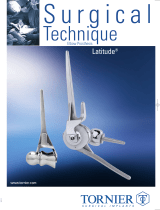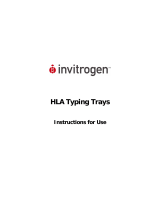
PrimaGen Advanced™
Allograft
Biologic Solutions
Recreating the benefits of the Gold Standard
while reducing the drawbacks

2 PrimaGen Advanced™ Allograft
The Complete Bone Remodeling Triad
Many currently available bone grafting materials
have some of the features necessary for successful
bone healing, but few possess all three of
the components of the bone remodeling
triad: osteoconductivity, osteoinductivity and
osteogenicity. In an effort to provide a graft material
that contains all three components without the
need to harvest autograft, advanced fresh-frozen
allografts were developed from cadaveric tissue
to meet this medical need. These allografts retain
osteoconductive and osteoinductive properties
as well as naturally inherent osteogenic cells.
PrimaGen Advanced Allograft has been
developed to overcome the limitations of
other bone graft substitutes and designed
to offer a real alternative to autograft.

PrimaGen Advanced™ Allograft 3
OSTEOGENIC
OSTEOCONDUCTIVE
OSTEOINDUCTIVE
Osteoconductive materials
provide the framework
(or scaffolding) within a
bony environment for cells
to infiltrate and attach.
Bone Remodeling Triad
Osteoinductive materials induce bone formation in
a bony or non-bony environment via the action of
growth factors or signaling proteins, including Bone
Morphogenetic Proteins (BMPs). These proteins
simulate the conversion of progenitor cells into
bone forming osteoblasts.1 ,2
Osteogenic materials
contain viable cells, such
as mesenchymal stem cells
(MSCs), osteoprogenitor
cells, or osteoblasts,
which are capable of
synthesizing new bone.

4 PrimaGen Advanced™ Allograft
The PrimaGen Advanced Allograft Process
Donor processing of PrimaGen Advanced Allograft begins
within 72 hours post-mortem. Processing is completed rapidly
in a controlled, aseptic environment designed to protect the
integrity of its viable components.
Composition
Cortical bone is processed into a fiber-like structure and
demineralized, retaining a variety of osteoinductive proteins
important for bone formation. The cancellous bone tissue is
morselized into particulate, creating a consistent graft. The
advanced, proprietary processing methods protect and
retain the naturally inherent osteogenic cells.
The DBM fibers and cancellous tissue containing naturally
adherent osteogenic cells are combined in a precise ratio
and frozen at -70˚C in a cryoprotective solution to preserve
cell viability.
WITHIN
72 HOURS
Donor processing begins
within 72 hours post-mortem.

PrimaGen Advanced™ Allograft 5
Cancellous bone containing naturally
adherent osteogenic cells is processed
into chips.
Cortical bone undergoes
demineralization, which retains natural
osteoinductive proteins.
Both are then mixed in a 1:1 ratio
and stored at -70˚C in cryoprotective
solution to preserve cell viability.
Donor processing begins
within 72 hours post-mortem.

6 PrimaGen Advanced™ Allograft
Streamline Your Procedures with an Advanced Delivery System
PrimaGen Advanced Allograft is packaged in an intuitive, proprietary
pre-filled delivery syringe and features a built-in filter that allows
for the full preparation of the material directly inside the syringe.
Graft Consistency
In addition to being packaged in an intuitive and
proprietary pre-filled delivery syringe, PrimaGen
Advanced Allograft is manufactured in a way that
provides optimal handling and graft consistency for
better packing. The structure of the cortical fibers
allows for better fluid retention and graft containment.*
A majority of bone grafting materials are made with
particulate that is very granular in consistency, which,
although suitable for certain applications, tends to fall
apart and may not be contained very well. PrimaGen
Advanced Allograft, however, utilizes a manufacturing
process that creates fibers from the cortical bone,
instead of particulate.
Precise Handling
The cortical fibers are demineralized and create a cohesive
graft that not only stays together, but also allows for better
retention of diluents such as saline.*

PrimaGen Advanced™ Allograft 7
Rinsing
Once the preservative has been removed, draw
some sterile saline into the syringe to help rinse
the remaining preservative off the graft. Dispense
the sterile saline by gently pushing on the plunger.
Note: Rinsing may be repeated if desired.
Note: Please see package insert for complete
preparation instructions.
PrimaGen Advanced Allograft should be
implanted within four hours after removing the
cryopreservative and replacing it with saline
(allow saline to remain inside the syringe until it
is ready for implantation). Once thawed, if the
cryopreservative solution is not immediately
decanted and replaced with sterile saline solution,
PrimaGen Advanced Allograft should be
implanted within two hours.
Removing Cryopreservative
After appropriately removing PrimaGen
Advanced Allograft from its packaging, thawing
can begin by submerging the syringe in a warm
water bath. Thawing must be fully complete
before removal of the cryoprotectant can begin.
Cryopreservative can be extracted from the
syringe by simply pushing gently on the plunger.
Note: Please see package insert for complete
preparation instructions.

8 PrimaGen Advanced™ Allograft
BONE REMODELING TRIAD
OSTEOGENIC
OSTEOCONDUCTIVE
OSTEOINDUCTIVE
Experience Complete Bone Remodeling
Characteristic Osteoconductivity Osteoinductivity Osteogenicity
Key Feature Cancellous bone matrix
offers an interconnected
trabecular structure
Allows for interface activity,
bone in-growth and
graft remodeling
Demineralized component
provides additional inherent
growth factors
Demineralized bone has been
shown to include BMP-2, 4, 6, 7,
VEGF, TGF-ß, PDGF, IGF-1 and FGF3, 4
At least 750,000 cells/cc of
cancellous tissue with at least
70% cell viability*
Cells include MSCs, osteoprogenitor
cells and pre-osteoblasts
Benefit Oers an optimal scaold for
bone-forming cells to migrate
and remodel
Delivers proteins that will trigger
the dierentiation and
proliferation of bone-forming cells
Provides bone-forming cells that
support the fusion process
Ecacy
Confirmation
Every lot contains dense
cancellous bone matrix
Every lot tested for
osteoinductivity
Every lot tested for in vitro
osteogenic dierentiation
Cryopreserved to maintain
cell viability
Test Method Processing specifications and
quality inspections ensure
consistent graft composition
Athymic Rat Ectopic Bone
Formation Assay/C2C12 Assay**
Osteogenic Assay
Trilineage Assay
Cell count with hemocytometer
and trypan blue stain
Results*,** Provides a trabecular
osteoconductive scaold
with optimal graft-packing
capabilities
Verifies osteoinductivity Demonstrates the presence of
MSCs and verifies the ability to
dierentiate into bone forming cells

PrimaGen Advanced™ Allograft 9
Discover the PrimaGen Advanced Allograft Solution
That Fits Your Procedures
DESCRIPTION CATALOG NUMBER
PrimaGen Advanced Allograft, 1cc PSTM001
PrimaGen Advanced Allograft, 5cc PSTM005
PrimaGen Advanced Allograft, 10cc PSTM010
PrimaGen Advanced Allograft, 15cc PSTM015
PrimaGen Advanced Allograft, Marketing Sample PSTM005S
PrimaGen Advanced Allograft

10 PrimaGen Advanced™ Allograft
Regulatory Requirements: PrimaGen Advanced Allograft is regulated by the FDA
as a Human Cellular and Tissue-Based Product (HCT/P) under 21 CFR Part 1271.
Sterility: PrimaGen Advanced Allograft is processed under aseptic conditions
in order to preserve the viable cells in the cancellous bone matrix and the
naturally occurring bone growth factors in the demineralized bone matrix (DBM).
Representative samples are sacrificed from each lot for destructive microbiological
verification testing per USP <71> Sterility Tests. Results must show “no growth”
after 14 days incubation in growth-promoting media.
Donor Eligibility: PrimaGen Advanced Allograft donors are accepted only
after passing through stringent screening criteria exceeding those set forth by
the AATB5 and FDA. Potential donors are evaluated through a multi-step process
that includes a review of medical records and a medical/social history interview with
family members. All donors are subjected to communicable disease marker testing by
a laboratory that is registered with the FDA in accordance with the Clinical Laboratory
Improvement Amendments of 1988 (CLIA) and 42 CFR part 493, or have met
equivalent requirements as determined by the Centers for Medicare and Medicaid
Services (CMS). The tissue bank’s medical director determines final eligibility and
acceptability after reviewing the donor screening and testing records.
Processing: PrimaGen Advanced Allograft is processed by some of the largest tissue
banks in the United States, with impeccable reputations and track records for safe
tissue procurement. All tissue banks affiliated with PrimaGen Advanced Allograft
are accredited by the American Association of Tissue Banks (AATB). PrimaGen
Advanced Allograft is procured from human donor tissue that meets strict
donor suitability requirements and is processed in a controlled environment using
methods designed to prevent contamination and cross-contamination of the tissue.
See the product Instructions for Use for a complete listing of the indications,
contraindications, warnings, precautions and adverse effects.
Excellent Safety Profile
PrimaGen Advanced Allograft is processed via stringent donor screening,
testing and sterility procedures. In addition to cytotoxicity testing and
extensive lot-to-lot donor screening, PrimaGen Advanced Allograft has
been validated to possess an excellent safety profile, as an allograft that
does not require Human Leukocyte Antigen (HLA) typing or patient
matching. Test samples of PrimaGen Advanced Allograft were shown
to be immune-protective in an in vitro study, in which immune cells were
not activated in the presence of PrimaGen Advanced Allograft.*, **
Donor screening criteria
exceeds that of the FDA
and the AATB guidelines.

PrimaGen Advanced™ Allograft 11
Screening Criteria for PrimaGen5,*PrimaGen AATB FDA
Non-medical drug use • • •
High-risk sexual history • • •
Incarceration • • •
Aesthetic needle use • • •
International travel • • •
Human Immunodeficiency Virus (HIV)–1 and 2 • • •
Hepatitis B Virus (HBV) • • •
Hepatitis C Virus (HCV) • • •
Transmissible Spongiform Encephalopathy (TSE) • • •
Creutzfeldt-Jakob Disease (CJD) • • •
Treponema Pallidum (Syphilis) • • •
Neisseria Gonorrhea • • •
West Nile Virus (WNV) • • •
Sepsis • • •
Vaccinia • • •
Active genital herpes • • •
Encephalitis • • •
Meningitis • • •
Xenotransplant recipient • • •
Clostridium • • •
Streptococcus Pyogenes • • •
Dementia • •
Malaria • •
Rabies • •
Clinically active tuberculosis • •
Leprosy (Hansen’s disease) • •
Systemic mycosis • •
Rheumatoid arthritis • •
Systemic lupus erythematosus • •
Polyarteritis nodosa • •
Sarcoidosis • •
Clinically significant metabolic bone disease • •
Methicillin Resistant Staphylococcus aureus (MRSA) •
Vancomyocin Resistant Enterococcus •
Epstein Barr Virus •
Cytomegalovirus (CMV) •
Chagas disease •
Malignancy •
Connective Tissue diseases •
Collagen diseases •
Disease of unknown etiology •
Various sexually transmitted diseases •
Wegener’s Granulomatosis •
Rheumatic fever •
Reactive Arthritis (Reiter Syndrome) •
Pyelonephritis •
Peritonitis •
Myasthenia Gravis •
Guillain-Barre Syndrome •
Endocarditis •
Anklosing Spondylitis •

©2016 Zimmer Biomet Spine, Inc. All rights reserved.
All content herein is protected by copyright, trademarks and other intellectual property rights, as applicable, owned by or licensed to Zimmer Biomet or
its aliates unless otherwise indicated, and must not be redistributed, duplicated or disclosed, in whole or in part, without the express written consent of
Zimmer Biomet. This material is intended for health care professionals. Distribution to any other recipient is prohibited.
For product information, including indications, contraindications, warnings, precautions, potential adverse eects and patient counseling information,
see the package insert and www.zimmerbiomet.com.
0747.1-US-en-REV1016
References:
1. Khan SN, Cammisa FP Jr, Sandhu HS, Diwan AD, Girardi FP, Lane JM. The biology of bone grafting.
J AM Acad Orthop Surg. 2005;13(1):77–86.
2. Han B, Tang B, Nimni ME. Quantitative and sensitive in vitro assay for osteoinductive activity of
demineralized bone matrix. J Orthop Res. 2003;21(4):648–54.
3. Pietrzak WS, Woodell-May J, McDonald N. Assay of bone morphogenetic protein -2, -4 and -7 in
human demineralized bone matrix. J Craniofac Surg. 2006;17(1):84–90.
4. Wildemann B, Kadow-Romacker A, Haas NP, Schmidmaier G. Quantification of various growth factors
in dierent demineralized bone matrix preparations. J Biomed Mater Res A. 2007;81(2):437–42.
5. American Association of Tissue Banks. Standards for Tissue Banking, 14th ed. McLean, VA: American
Association of Tissue Banks, 2016.
8 0 0 .4 47. 3 62 5 ⁄ zimmerbiomet.com
*Data on file.
** Pre-clinical Disclaimer: In vitro cellular and pre-clinical studies may not be
indicative of human clinical outcomes.
/






